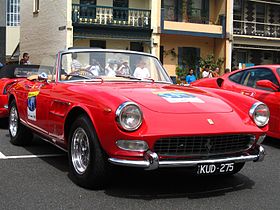Ferrari 275
| Ferrari 275 GTB, GTS, GTB/4, NART Spider |
|
|---|---|

1967 Ferrari 275 GTB
|
|
| Overview | |
| Manufacturer | Ferrari |
| Production | 1964 — 1968 970 produced |
| Designer | Pininfarina |
| Body and chassis | |
| Class | Grand tourer (S) |
| Chronology | |
| Predecessor | Ferrari 250 |
| Successor | Ferrari 365 GTB/4 |
| 275 GTB, 275 GTB/C | |
|---|---|
 |
|
| Overview | |
| Production | 1964 — 1966 |
| Body and chassis | |
| Body style | 2-door coupé |
| Powertrain | |
| Engine | 3.3 L V12 |
| 275 GTS | |
|---|---|

Ferrari 275 GTS
|
|
| Overview | |
| Production | 1964 — 1966 200 produced |
| Body and chassis | |
| Body style | 2-door spider |
| Powertrain | |
| Engine | 3.3 L V12 |
| Chronology | |
| Successor | Ferrari 330 GTS |
| 275 GTB/4 | |
|---|---|
| Overview | |
| Production | 1966 — 1968 |
| Body and chassis | |
| Body style | 2-door coupé |
| Powertrain | |
| Engine | 3.3 L 4-cam V12 |
| 275 GTB/4 NART | |
|---|---|
 |
|
| Overview | |
| Production | 1966 — 1968 |
| Body and chassis | |
| Body style | 2-door spider |
| Powertrain | |
| Engine | 3.3 L 4-cam V12 |
The Ferrari 275 is a series of two-seat front-engined V12-powered automobiles produced in GT, roadster, and spyder form by Ferrari between 1964 and 1968. The first Ferrari to be equipped with a transaxle, the 275 is powered by a 3.3 L (3286 cc) Colombo 60° V12 engine that produces 280-300 hp.
Pininfarina designed the GT and roadster bodies, Scaglietti the rare NART Spyder, among the most valuable of all Ferraris made. In a contemporary road test, Road & Track described it as "the most satisfying sports car in the world."
Motor Trend Classic named the 275 GTB gran turismo/GTS roadster as number three in their list of the ten "Greatest Ferraris of all time".
The 275 GTB/4 debuted in 1966. A much updated 275 GTB, the four overhead camshaft, six 2-barrel carbuerated 275 GTB/4 was named number seven on Sports Car International's 2004 list of Top Sports Cars of the 1960s.
The 275 GTB was a two-seat gran turismo automobile produced between 1964 and 1968 with a 3.3 litre Colombo 60-degree V-12 engine displacing 275 cc per cylinder and producing 280-300 horsepower.
The standard 275 GTB coupe was produced by Scaglietti and was available with 3 or 6 Weber twin-choke carburettors. It was more of a pure sports car than the GT name suggested. Some cars were built with an aluminium body instead of the standard steel body. A Series Two version with a longer nose appeared in 1965.
For the 1965 racing season, 4 lightweight 275 GTB Competizione Speciales (1964), a prototype and three production models, were built and equipped with 250 LM engines. The design was by Pininfarina and the coachwork by Scaglietti. The design incorporated reduced weight with a ten percent reduction in size, smaller diameter chassis, 21 gauge alloy body, Plexiglas windows, and magnesium was used in certain engine and transaxle castings. The Fédération Internationale de l'Automobile (FIA) at first refused to homologate the model as a GT contender but settled on a compromise when Enzo Ferrari threatened to abandon the motor sport
...
Wikipedia
